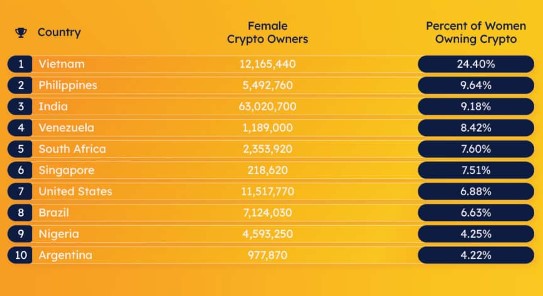2021-11-1 18:00 |
The crypto space continues its expansion into mainstream industries. However, for women the path to involvement is sometimes unclear or seemingly inaccessible. Those who have made it are encouraging others to join them in the metaverse.
According to reports, the first half of 2021 saw nearly double the number of investments and interest than all of 2020. However, all this attention comes from multiple avenues. From individuals and major companies to large scale institutional investors crypto seems to be on everyone’s radar.
Though within those groups, the question remains: How can underserved demographics and communities obtain access and space within the crypto world? In such a male-dominated industry, women especially have barriers to access and opportunities.
A recent poll from CNBC says that only 31% of surveyed crypto investors are women. While that number may seem higher than anticipated, roughly 15% of United States-based investors have crypto investments. Therefore in terms of size and numbers, 31% leaves women with a very small community to fall back on.
As such, for women, it can be daunting for women, especially for those who aren’t already in male-dominated STEM fields. For those who may not have a financial or coding background that makes understanding this space slightly easier.
Nonetheless, there are some promising numbers from a long term viewpoint. A CoinMarketCap study saw an increase of over 43% in women investors in the last quarter of 2020.
According to women already breaking barriers and paving the way in the crypto industry, a key to this inclusive future is community.
Crypto communitiesBlockFi recently released data on how women most interact with the crypto space. As claimed by their findings, 50% of polled women get information on finances and investments from their friends and family. However, when asked about the initiation of such conversations, the person introducing them was often a male.
Amber Ghaddar, the co-founder of AllianceBlock, remarked on the early days in the space when women first involved themselves in community groups. “Where these networks are male-dominated, it’s very hard for a woman to join,” she said. “In the early days, many of these groups could be described as having a ‘crypto bro’ culture.”
However, this is changing. “Now, we’re seeing more and more women founding, advising on or talking about new projects, investments, and sharing their opinions,” she says.
Ghaddar mentions one group in particular, “The Bigger Pie,” which she participates in and called an encouraging space.
“It is one of the most active for women in blockchain communities. In this particular group, you’ll find a fantastic mix of women in very senior roles that might be just entering the blockchain space for the first time, experienced women, as well as those at the beginning of their career. It’s a valuable place where women support women.”
Communities create a repository of resources, from female investors, content creators, and high-level personnel for future networking. As data shows that women rely so much on their networks, it’s important for women in the space to have these connections which could open doors for more women in more places outside of gendered community groups.
Amber cited stats from the United Kingdom’s Office of National Statistics, which reports that only 12.5 % of developers are females. Additionally, women occupy only 31% of UK tech jobs.
Financial managementAll three women mentioned an important benefit of the crypto space, which manifests as financial empowerment via digital currencies.
Gloria Wu, the Chief of Ecosystem Partnerships At Ontology, brought up DeFi’s “boundary-breaking” abilities for women.
“Decentralized finance offers more opportunities for authentic creativity and boundary-breaking that would be more difficult to pursue in the highly regimented traditional financial industry. Let’s not forget that traditional finance is also male-dominated, so neither sector is exempt,” she says.
Wu says women’s role in the redefinition of what finance is, is key.
It’s also important to look at how blockchain solutions bring those in countries rife with political and economic instability, more financial opportunities.
31% of adults across the globe do not have a home bank. This is particularly striking for women in countries where they do not hold the same financial rights as men.
“In this sense, blockchain technology offers women in particular and emerging market citizens, in general, many alternatives to creating and/or preserving your wealth,” Ghaddar said.
A great example of this is in Afghanistan prior to the recent Taliban takeover. A local non-profit taught thousands of girls and women basic computer skills and financial services. According to reports, almost a third of the nearly 16,000 girls and women learned how to set up a crypto wallet and access funds.
Moreover, some started trading bitcoin and ethereum. Some of the proceeds earned reportedly helped these women leave the country during the Taliban takeover in August.
Identity free interactionsAfghanistan is a good example of how women could forego typical gender norms via crypto. The wallets and platforms which helped them have financial freedom don’t care whether they’re male or female.
In fact, Wu said the lack of identity in the crypto space made it easy for her to find her own place.
“A lot of the information in the space is shared online behind pseudonymous names and there is no difference in the treatment associated with the gender of the opinion voiced. This has certainly made it easier and more accessible to move into such a male-dominated space,” she explains.
Moreover, Holly Atkinson, Metaverse lead at Boson Protocol, called this a major plus for female DAO participation.
“With DAOs, everyone has voting rights based on participation,” she said. “Typically, you won’t need to share any significant personal details to be a member. This means that participation as an unknown entity is enabled, making many DAOs inherently inclusive – and a great place to start as a woman in Web 3.”
Atkinson said the metaverse will be a space in which one can choose their identity without limitations. “From the outset, you have no limits by any real-life aspect. With this comes no stereotypes or presumptions that might come into play in the physical world. This gives the Metaverse the opportunity to be an inclusive and equal place for all.”
This said, all three women encourage other women to join communities and step fearlessly into crypto.
“There is no need to be scared, there are plenty of opportunities to learn out there but you do need to accept that some parts might be challenging. Follow your own path and try not to only be led by others in the industry,” encourages Wu.
The post Women and Web 3.0 — Experts Weigh-In On Community and Financial Freedom appeared first on BeInCrypto.
origin »Bitcoin price in Telegram @btc_price_every_hour
WomenCoin (WOMEN) íà Currencies.ru
|
|








